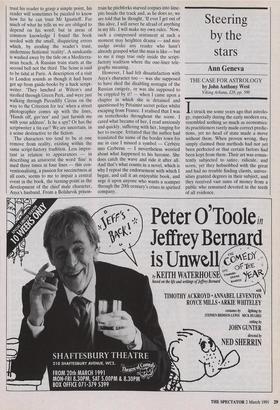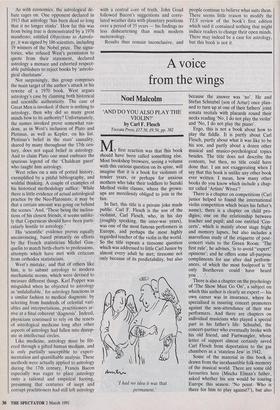Steering by the stars
Ann Geneva
THE CASE FOR ASTROLOGY by John Anthony West
Viking Arkana, £20, pp. 500
It struck me some years ago that astrolo- gy, especially during the early modern era, resembled nothing so much as economics: its practitioners rarely made correct predic- tions, yet no head of state made a move without them. When proven wrong, they simply claimed their methods had not yet been perfected or that certain factors had been kept from them. Their art was consis- tently subjected to satire, ridicule, and scorn; yet they hobnobbed with the great and had no trouble finding clients, univer- sities granted degrees in their subject, and they received vast sums of money from a public who remained devoted in the teeth of all evidence. As with economics, the astrological de- bate rages on. One opponent declared in 1913 that astrology 'has been dead so long that it no longer stinks'. How far this was from being true is demonstrated by a 1976 manifesto; entitled Objections to Astrolo- gy, it was signed by 186 scientists, including 19 winners of the Nobel prize. The signa- tories, who refused West's permission to quote from their statement, declared astrology a menace and exhorted respect- able publishers to reject books by 'astrolo- gical charlatans'.
Not surprisingly, this group comprises the main target of the author's attack in his rewrite of a 1970 book. West argues astrology's case by claiming both historical and scientific authenticity. The case of Great Men is invoked: if there is nothing to astrology, then why did so many great minds bow to its authority? Unfortunately, the names invoked prove somewhat ran- dom, as in West's inclusion of Plato and Plotinus, as well as Kepler, on his list. Plotinus's belief in the stars' causality, shared by many throughout the 17th cen- tury, does not equal belief in astrology. And to claim Plato one must embrace the spurious legend of the 'Chaldean guest' who taught him astrology.
West relies on a mix of potted history, exemplified by a pitiful bibliography, and wishful thinking. A couple of examples of his historical methodology suffice: 'While there is little evidence of actual astrological practice by the Neo-Platonists, it may be that a certain amount was going on behind the scenes.' And, 'These being the inclina- tions of his closest friends, it seems unlike- ly that Copernicus should have been parti- cularly hostile to astrology.' His 'scientific' evidence proves equally unconvincing, based primarily on efforts by the French statistician Michel Gau- quelin to match birth-charts to professions, attempts which have met with criticism from orthodox statisticians.
West's mistake, and that of others like him, is to submit astrology to modern mechanistic norms, which were devised to measure different things. Karl Popper was misguided when he objected to astrology as 'unfalsifiable,' for astrology functions in a similar fashion to medical diagnosis: by selecting from hundreds of celestial vari- ables and interpretations, practitioners ar- rive at a final coherent 'diagnosis'. Indeed, physicians continued to rely on the tenets of astrological medicine long after other aspects of astrology had fallen into disrep- ute in intellectual circles.
Like medicine, astrology must be filt- ered through a gifted human medium, and is only partially susceptible to experi- mentation and quantifiable analysis. These methods were actually applied to astrology during the 17th century. Francis Bacon especially was eager to place astrology onto a rational and empirical footing, presuming that centuries of inept and corrupt practitioners had still left astrology with a central core of truth. John Goad followed Bacon's suggestions and corre- lated weather data with planetary positions over a period of 35 years — his findings no less disheartening than much modern meteorology.
Results thus remain inconclusive, and people continue to believe what suits them. There seems little reason to modify the TLS review of the book's first edition which said it contained nothing that might induce readers to change their open minds. There may indeed be a case for astrology, but this book is not it.



















































 Previous page
Previous page